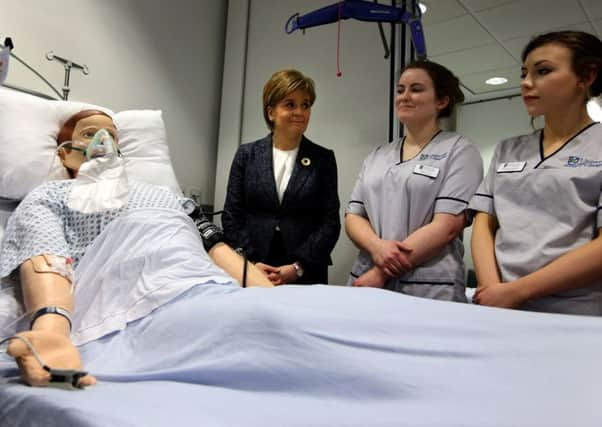SNP pledge 500 more nurses and £27m health funding boost


The First Minister set out measures to boost access for students to the medical professions as it emerged 53 GP practices have been forced to bring in restrictions on patient numbers.
The funding would cover £3m for 500 extra specialist nurses as well as £23m to create 50 new medical school places while widening access for disadvantaged students.
Advertisement
Hide AdAdvertisement
Hide AdLabour accused the First Minister of simply reversing cuts made when she was health secretary as 50 new places would bring the figure into line with the level in 2008.
Ms Sturgeon also made a commitment to retain student nurse bursaries and introduce a £1m safety net for the poorest candidates.
In a speech at Queen Margaret University in Musselburgh, East Lothian, yesterday, Ms Sturgeon said: “We need to make sure that we are training the right numbers of professionals – in and across different specialisms – with the skills they need for the health service of the future.
“That’s why this additional funding of £27m is so crucial in ensuring the NHS in Scotland remains robust, resilient and ready for the challenges of the 21st century.”
Advertisement
Hide AdAdvertisement
Hide AdMedical leaders have warned that Scotland faces a shortfall of 900 GPs by 2020 and around 40 per cent of midwives are approaching retirement.
Ms Sturgeon said: “We already know the next decade will present real challenges for us in recruiting GPs. Many of our current GPs are due to retire and an increasing proportion will choose to work part-time.
“What we need to do is take action now to address that and that’s why we’ve increased the number of GP training places from 300 a year to 400 and we’re trying to encourage former GPs who have perhaps left the profession to care for children or elderly relatives to come back.”
She added: “We’ve got to recognise the demographics of the profession as well as the increasing demand.
Advertisement
Hide AdAdvertisement
Hide Ad“That’s why we’re doing the increase in the places to get more GPs trained and into the system. Also within medical training there are steps afoot to encourage people to look at general practice as an option rather than necessarily going into another specialism.”
Concerns were raised over shortages of care workers last month when figures showed more than 270 people died whilst waiting for care.
Labour public services spokeswoman Jackie Baillie said yesterday: “This is Nicola Sturgeon admitting she got it wrong as health secretary nearly a decade ago.
“Nicola Sturgeon is now reversing cuts her own SNP government made to medical student numbers because primary care is facing its worst crisis in a generation.
Advertisement
Hide AdAdvertisement
Hide Ad“Under the SNP we are seeing a crisis of family doctors that the First Minister has only just seemed to have realised. We have seen a drop in funding totalling over £1 billion, fewer medical students, fewer trainee vacancies being filled fewer out-of-hours sessions being staffed.”
Scottish Liberal Democrat health spokesman Jim Hume said: “This is a recruitment crisis that the First Minister is only just waking up to and how fortunate just before an election.
“This is a rushed response to what she knows are ticking timebombs but will not provide additional resources immediately.
“This investment is a drop in the ocean that will not deliver what’s needed so desperately on the ground.”
Advertisement
Hide AdAdvertisement
Hide AdDr Peter Bennie, chairman of BMA Scotland, said: “We would want to see additional investment made to ensure that on completion of their course, training places are available for these additional graduates to encourage them to stay and work in Scotland.”
The additional investment was welcomed by Professor Derek Bell, president of the Royal College of Physicians of Edinburgh.
He said: “Widening participation in the medical profession is a key element in addressing the future challenges of the NHS.
“We must ensure that a career in medicine is open to all those with ability and not restricted by factors such as socio-economic status.”
Advertisement
Hide AdAdvertisement
Hide AdTheresa Fyffe, Royal College of Nursing Scotland director, said: “The First Minister demonstrated an awareness of the crucial role that today’s nurses play in delivering health services in hospitals and across our communities. The package of measures will help ensure that future generations benefit from the unique skills and knowledge members of nursing teams bring.”